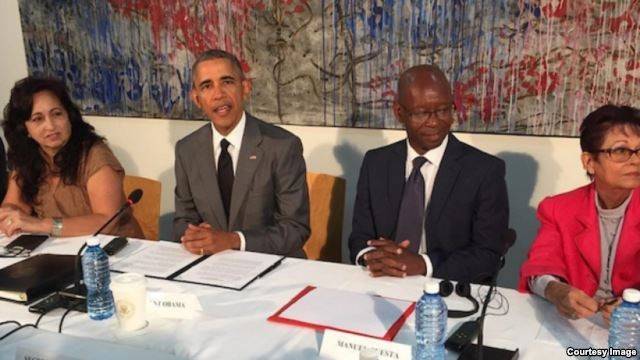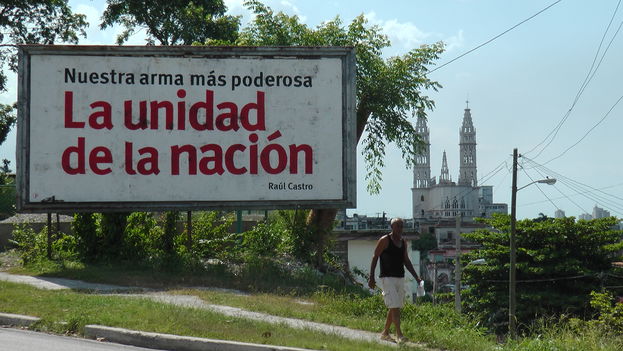
![]() 14ymedio, Manuel Cuesta Morua, Havana, 7 May 2016 — I am offering, for critical discussion, a viewpoint discussed in more than one place about what I consider the progressive and punctilious deconstruction of our national project. Cuba is no longer one nation, but rather an unfinished project. I will offer this in two parts, not only in line with the needs of newspaper publishers, but also so as to not overly exhaust my readers with a piece of writing that could become tedious. I insist, however, because like many Cubans, I feel the dynamic drive of my country, as described by Manuel Manolín González Hernández, “the Salsa doctor” as he is called, in his cogent letter to Fidel Castro.
14ymedio, Manuel Cuesta Morua, Havana, 7 May 2016 — I am offering, for critical discussion, a viewpoint discussed in more than one place about what I consider the progressive and punctilious deconstruction of our national project. Cuba is no longer one nation, but rather an unfinished project. I will offer this in two parts, not only in line with the needs of newspaper publishers, but also so as to not overly exhaust my readers with a piece of writing that could become tedious. I insist, however, because like many Cubans, I feel the dynamic drive of my country, as described by Manuel Manolín González Hernández, “the Salsa doctor” as he is called, in his cogent letter to Fidel Castro.
It is always necessary to think of one nation, but after the fiasco of the recently concluded pedagogic 7th Party Congress, in which the substantive content of the words were the words themselves, to think of the nation plurally, I believe, is an imperative for survival.
Where is the Cuban nation headed? Almost everyone agrees, as commonly expressed, we are all in the same boat. And as the boat must sail in a reasonable and civilized way, I believe it is necessary to think and discuss, to read and reread, and above all, to imagine.
The Cuban nation is not defined by a self-selected group, but by its citizenry: the only legitimate body for such an enterprise.
As we have been trapped in very harsh political processes, people get used to it and are no longer impressed or intimidated by the idea that Cuba belongs to a “very special” group of people who are given to calling themselves revolutionaries. Cubans and foreigners both, we have accepted this classification, which could have great weight and standing, but which does not coincide with Cuban culture and nationality, which are the two main conditions of belonging to Cuba or to any other nation and, above all, the two that can experience collateral damage or benefit, according to the angle of position.
Still today, after the almost grotesque exhaustion of all the most respectable meanings of revolution—that of Nicolas Maduro’s Venezuela is dreadful—many people are put on the defensive for desiring changes for Cuba. They must explain that they are not counterrevolutionaries and do not want to work in support of “imperialism” without considering that the term counterrevolution in Cuba can now acquire the same—exceedingly positive—connotation as mambí, the term pejoratively applied by the Spanish in the nineteenth century to refer to Cuban insurrectionists, that is those who were fighting for Cuba’s independence. And that is not right. At least in the arena of words and ideas. The debate of ideas in Latin America has lacked mental strength. On the side of the democrats.
For me, any case, beyond this discussion, the fundamental question that must be asked so as not to let oneself be impressed by the psychological violence of power is, who defines what? And the Cuban nation is not defined by a self-selected group, but by its citizenry: the only legitimate body for such an enterprise. Revolution as a source of law is a reactionary concept. What is overlooked, perhaps in an opportunistic way, is that there comes a time in which the revolutionaries make themselves the power, and thus, unfortunately, they have not differed either in form or in justifications from more traditional political models.
In any case—that of Cuba is special in this sense—they have revived modes and rationales that were supposedly buried by modernity. A simple irony is that, once in power, the revolutionaries openly and profusely use the concepts of subversion and stability to defend themselves against their adversaries. The least revolutionary concepts that could exist, and ones that would be applauded by Prince Metternich, the Austrian Chancellor who led the most thunderous conspiracy against the French Revolution.
The second essential thing is the realization that the citizen is the legitimator par excellence, if we want to avoid regressing to states of more or less divine origin.
The citizen is the legitimator par excellence, if we want to avoid regressing to States of more or less divine origin
In Cuba we need to define a new country from history, from politics and from culture, and from the mentality of subjects and actors in and for an inclusive national project. This definition, after all, must include a consideration of the international context to explain to ourselves our options and possibilities as a nation, something that in Cuba is fundamental, because it has historically been defined in negative terms. We who should not belong, rather than we who own the nation, is an old and unresolved dilemma.
At the end of the ‘90s and in the early 2000s, Cuba let the beginning of the new era pass it by, an era which, from my perspective, began with the end of apartheid in South Africa.
The end of apartheid in South Africa was the stark political expression of this cultural movement, and demonstrated the ethical unviability of cultural hegemony in territories with diverse populations. Nelson Mandela’s reconciliatory solution captured the message that the new South African contract could not be based on a new hegemony that marginalizes diverse traditions within a single nationality.
In the Western Hemisphere, this new contract begins in Bolivia, with the ascent to power of Evo Morales as a representative of America’s forgotten and exploited ancestry. And even though he has been repeating the same pattern of hegemony he fought against, his importance is there: the Western Hemisphere is open to this cultural movement that defines the new legitimacy of future social and political contracts: cultural diversity conveyed through the political citizen.
The latest and most vigorous expression of this movement was the ascent to power of Barack Obama in the United States. His arrival brought a nuance that confirms the irreversibility of this cultural movement: the ascent of cultural minorities, given their capacity to build majorities, to the legitimate field of political decisionmaking.
The new era begins with two connected powers: the power of diversity for the civil reconstruction of states and the power of the imagination which this diversity provides for solving the problems that the world has inherited from the excess of hegemonies based on criteria of superiority. It is the clear triumph of the new anthropology and of its associated aesthetic, which has few global precedents.
Cuba, which needed to sign this new contract in order to structure a new country, dangerously distanced itself from this global current, 57 years after the failure of its own scheme of hegemonies.
In July of 2006 [ed. note: when Fidel Castro, seriously ill, transferred the duties of president to his brother Raul] it seemed that the Cuban authorities approached society in order to enter this new era, and in order to take the initial steps toward this new contract. Ten years later, they irresponsibly wasted the opportunity, only to behold how the United States took the initiative within this cultural movement, even within Cuba.
Beyond the contrast or the comparison between the two societies, the issue is capital from the strategic point of view, due to the political and cultural dispute with which the American political class confronts the Cuban government, and the importance of the political decisions in Washington for the kinds of defensive responses from the Cuban government.
The fact that an ever increasing number of citizens are willing to leave behind revolutionary citizenship in favor of dual citizenship is a sign of lack of confidence in Cuba’s possibilities as a nation.
The paralysis in the project—which does not proceed—of “structural and conceptual changes” that demand the country to reflect, in any case, both on the lack of imagination in the current political hegemony of Cuba as well as on its inability to absorb the force, the elements and the civil consequences of our own cultural diversity, is endangering Cuba’s continuity as a viable nation in the medium and long term.
The danger is also immediate, although its consequences are strategic. The accelerated loss of confidence in the government accelerated the loss of time-confidence in society and, most importantly, of nation-confidence. The fact that an ever increasing number of citizens are willing to leave behind revolutionary citizenship in favor of dual citizenship is a sign of lack of confidence in Cuba’s possibilities as a nation. A message that in Cuba one can live as a Spaniard, as French, American or Italian, that is, as a global citizen, but not as a Cuban.
We have here a first foundational rupture that now confronts two other dangers: first, the lack of leadership and vision within the Government to address the country’s challenges in a global era; and, second, its metaphysical perseverance in the idea of a Revolution that is rapidly losing its social registers to strengthen its punitive registers. That Revolution is supported more by the police force than by its philosophy. First hand out bread, to later offer punishment.

